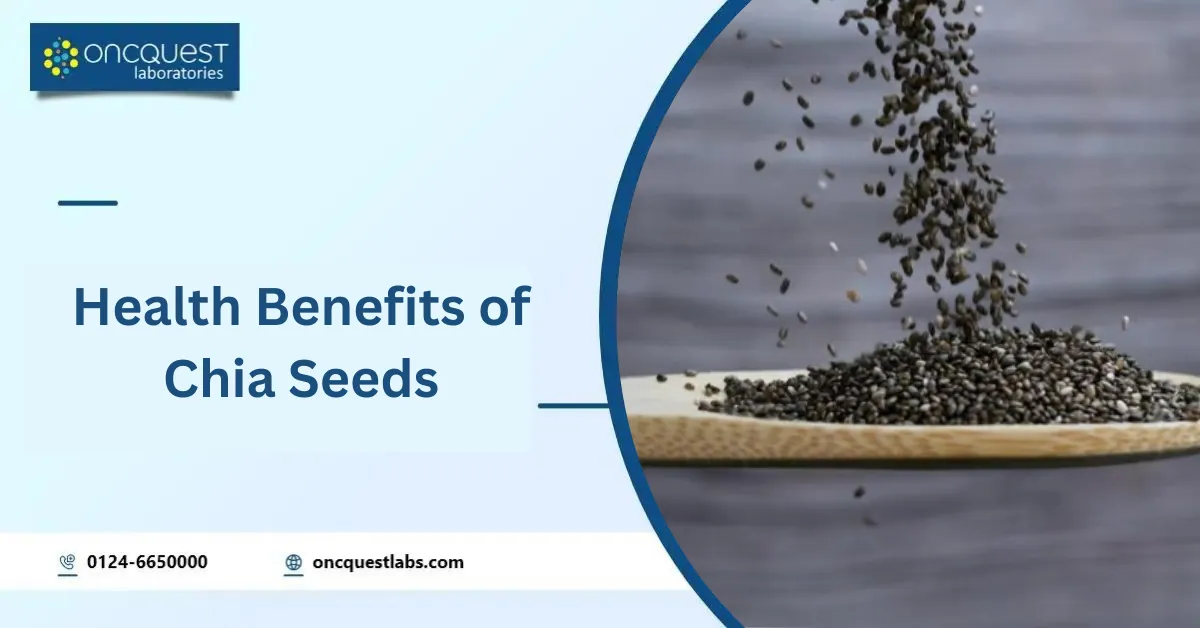Chia seeds have rapidly gained popularity as a superfood, and for good reason. These tiny seeds, derived from the plant Salvia hispanica, are packed with an impressive array of nutrients. Long used by ancient civilizations such as the Aztecs and Mayans for their energy-boosting properties, chia seeds are now celebrated for their versatile health benefits. Incorporating chia seeds into your diet can improve heart health, support digestion, aid in weight management, and provide essential nutrients that promote overall well-being. In this article, we’ll explore the various health benefits of chia seeds and how you can easily include them in your daily meals.
Contents
Nutrition of Chia Seeds (Per 2 tablespoons/28 grams)
| Nutrient | Amount |
| Calories | 137 |
| Protein | 4.7 grams |
| Total Fat | 8.6 grams |
| Omega-3 Fatty Acids | 5 grams |
| Omega-6 Fatty Acids | 1.6 grams |
| Carbohydrates | 12 grams |
| Fiber | 10 grams |
| Calcium | 177 mg (18% DV) |
| Magnesium | 95 mg (23% DV) |
| Phosphorus | 265 mg (27% DV) |
| Potassium | 44.8 mg (1% DV) |
| Zinc | 1.0 mg (7% DV) |
| Iron | 2.2 mg (12% DV) |
| Vitamin B1 (Thiamine) | 0.2 mg (15% DV) |
| Vitamin B2 (Riboflavin) | 0.1 mg (6% DV) |
| Vitamin B3 (Niacin) | 2.5 mg (13% DV) |
| Folate | 7.7 mcg (2% DV) |
| Vitamin E | 0.1 mg (1% DV) |
This table highlights the rich nutritional content of chia seeds, showcasing their high levels of fiber, healthy fats, and essential vitamins and minerals.
Health Benefits of Chia Seeds
Chia seeds are a nutrient-dense superfood that offers a wide range of health benefits. Here, we delve into the detailed benefits of incorporating chia seeds into your diet:
1. Heart Health
Chia seeds are rich in omega-3 fatty acids, particularly alpha-linolenic acid (ALA), which play a crucial role in maintaining cardiovascular health. Omega-3s help reduce inflammation, lower blood pressure, and decrease the levels of LDL cholesterol and triglycerides, all of which contribute to a reduced risk of heart disease. Additionally, the high fiber content in chia seeds helps to lower cholesterol levels and stabilize blood sugar levels, further supporting heart health.
2. Digestive Health
The fiber content in chia seeds is exceptionally high, with about 10 grams per 28-gram serving. Most of this fiber is soluble, which absorbs water and forms a gel-like substance in the digestive tract. This aids in promoting regular bowel movements, preventing constipation, and supporting a healthy gut microbiome. Soluble fiber also acts as a prebiotic, feeding beneficial gut bacteria and enhancing overall digestive health.
3. Weight Management
Chia seeds are an excellent addition to a weight management plan. The high fiber and protein content promote feelings of fullness and satiety, which can reduce overall calorie intake. Fiber slows down the digestion process, keeping you fuller for longer periods. Moreover, chia seeds are low in calories, making them a nutrient-dense food that supports weight loss and maintenance efforts without adding excess calories.
4. Bone Health
Chia seeds are a great source of several nutrients essential for bone health, including calcium, phosphorus, and magnesium. A 28-gram serving provides about 18% of the daily recommended intake of calcium, which is vital for maintaining bone density and strength. Magnesium and phosphorus also play key roles in bone formation and maintenance. Including chia seeds in your diet can help reduce the risk of osteoporosis and support overall skeletal health.
5. Blood Sugar Regulation
The high fiber content in chia seeds helps regulate blood sugar levels by slowing the absorption of sugar into the bloodstream. This can prevent spikes and crashes in blood glucose levels, making chia seeds particularly beneficial for individuals with diabetes or those at risk of developing diabetes. Additionally, the combination of fiber, protein, and healthy fats in chia seeds helps maintain steady energy levels and reduces the risk of insulin resistance.
6. Antioxidant Properties
Chia seeds are rich in antioxidants, including quercetin, chlorogenic acid, and caffeic acid, which help combat oxidative stress and protect the body against chronic diseases. Antioxidants neutralize free radicals, reducing inflammation and lowering the risk of conditions such as heart disease, cancer, and diabetes. These compounds also help preserve the health of skin, hair, and overall cellular function.
7. Skin and Hair Health
The omega-3 fatty acids and antioxidants in chia seeds promote healthy skin and hair. Omega-3s help maintain skin hydration, elasticity, and reduce inflammation, which can help manage conditions like acne and eczema. Antioxidants protect the skin from damage caused by UV radiation and environmental pollutants, promoting a youthful appearance. Additionally, the protein and essential nutrients in chia seeds support hair strength and shine.
8. Energy and Endurance
Chia seeds were historically used by ancient civilizations like the Aztecs and Mayans to boost energy and endurance. They provide a balanced combination of carbohydrates, protein, and healthy fats, making them an excellent source of sustained energy. The slow digestion of chia seeds provides a steady release of energy, helping to enhance physical performance and stamina.
Side Effects of Chia Seeds
While chia seeds are celebrated for their numerous health benefits, it’s important to be aware of potential side effects, particularly when consumed in large quantities or by individuals with specific health conditions. Here’s an in-depth look at the possible side effects of chia seeds:
Digestive Issues
Chia seeds are rich in fiber, which can sometimes lead to digestive issues like bloating, gas, and stomach cramps, especially if you’re not used to a high-fiber diet. The key to avoiding these problems is to gradually introduce chia seeds into your diet and ensure you drink plenty of water. Proper hydration helps the fiber in chia seeds move smoothly through the digestive system, reducing the risk of constipation and discomfort. Moderation and adequate fluid intake are essential for enjoying the digestive benefits of chia seeds without the side effects.
Allergic Reactions
Allergic reactions to chia seeds, though rare, can occur and may include symptoms such as rashes, hives, itching, swelling of the lips or tongue, difficulty breathing, and in severe cases, anaphylaxis. People with known seed allergies, especially to mustard or sesame seeds, might experience cross-reactivity with chia seeds. If you suspect an allergy, it’s essential to consume chia seeds cautiously and consult with a healthcare provider to ensure safety. If any severe allergic symptoms occur, seek immediate medical attention.
Blood Sugar Levels
Chia seeds can help regulate blood sugar levels due to their high fiber content, which slows the absorption of sugar into the bloodstream. This can be particularly beneficial for individuals with diabetes, as it helps prevent blood sugar spikes and promotes stable energy levels. However, consuming large amounts of chia seeds may lead to hypoglycemia, especially for those on diabetes medications. It’s essential to monitor blood sugar levels and consult with a healthcare provider to ensure chia seeds are safely integrated into the diet.
Blood Pressure and Clotting
Chia seeds are rich in omega-3 fatty acids, which can have a blood-thinning effect. While beneficial for heart health, this can pose issues for individuals with low blood pressure or those on blood-thinning medications, increasing the risk of excessive bleeding or bruising. If you have low blood pressure or are taking anticoagulant or antiplatelet medications, it’s important to consult with your healthcare provider before adding chia seeds to your diet to ensure safe consumption levels.
How much chia seeds should you eat a day?
A typical serving size of chia seeds is one ounce, which is about 2-3 tablespoons or 28 grams. It’s important to drink enough water when eating chia seeds to avoid digestive problems.
While there’s some research showing that daily consumption of chia seeds might help with weight loss and improve bone strength, most of this research has been done on animals. It’s important to note that eating too many chia seeds can cause side effects, so it’s best to start with a small amount, like 1 ounce (28 grams) per day.
Drinking plenty of water alongside chia seeds can help prevent any potential digestive issues. It’s also good to remember that chia seeds are a nutritious addition to your diet, but they should be consumed in moderation as part of a balanced eating plan. Starting with a small serving size and gradually increasing if tolerated well is a wise approach to reap their potential benefits without experiencing any adverse effects.
Do chia seeds burn belly fat
Research, including both animal and human studies, indicates that chia seeds may have the potential to reduce visceral (belly) fat, but more extensive and higher-quality studies are required to confirm these findings definitively. A tablespoon of chia seeds is approximately 0.5 ounces or 14 grams, which is generally considered a safe and small amount without causing side effects. However, for noticeable benefits, a slightly higher intake may be beneficial.
Chia seeds are not just nutrient-rich, containing minerals, omega-3 fats, antioxidants, and fiber, but they are also easy to include in your meals. While studies suggest several health advantages of chia seeds, such as aiding in weight loss and reducing heart disease risk, further research involving larger human populations is necessary to establish concrete conclusions.
To harness the potential benefits of chia seeds, you can easily incorporate them into your diet. They complement various foods like smoothies, oatmeal, yogurt, and baked goods, making them a versatile and nutritious addition to your meals.
How to Eat Chia Seeds
Chia seeds are incredibly versatile and can be easily incorporated into various meals and snacks. Here are some popular and simple ways to enjoy chia seeds:
- Chia Pudding:
- Mix 2 tablespoons of chia seeds with 1 cup of milk or a milk alternative.
- Sweeten with honey, maple syrup, or a few drops of vanilla extract.
- Let it sit in the refrigerator for at least 4 hours or overnight until it reaches a pudding-like consistency.
- Add fresh fruit, nuts, or granola as toppings.
- Smoothies:
- Add 1-2 tablespoons of chia seeds to your favorite smoothie.
- Blend with fruits, vegetables, yogurt, and liquids like water, milk, or juice.
- Chia seeds add thickness and a nutrient boost to your smoothie.
- Sprinkled on Salads:
- Sprinkle a tablespoon of chia seeds over salads for a crunchy texture.
- They pair well with both green salads and grain-based salads.
- Baking:
- Incorporate chia seeds into baked goods such as muffins, breads, and cookies.
- Substitute up to 25% of the flour with ground chia seeds in recipes.
- Use chia gel (chia seeds soaked in water) as an egg substitute in vegan baking. Mix 1 tablespoon of chia seeds with 3 tablespoons of water and let it sit until it forms a gel.
- Yogurt or Oatmeal:
- Stir in a tablespoon of chia seeds into your yogurt or oatmeal.
- Add fruits, nuts, or honey for extra flavor and nutrition.
- Chia Fresca:
- Mix 1-2 tablespoons of chia seeds into a glass of water or juice.
- Let it sit for about 10 minutes until the seeds swell and form a gel.
- Stir well and enjoy a refreshing, hydrating drink.
Tips for Eating Chia Seeds
- Hydrate: Always consume chia seeds with plenty of liquids to prevent any potential digestive issues.
- Start Small: If you’re new to chia seeds, start with a small amount and gradually increase your intake.
- Grind or Soak: Grinding or soaking chia seeds can make them easier to digest and enhance nutrient absorption.
By incorporating chia seeds into your diet in these various ways, you can enjoy their health benefits and add a nutritious boost to your meals and snacks.
Conclusion
In conclusion, chia seeds are a powerhouse of nutrition that can easily be incorporated into a wide range of dishes. From chia pudding to smoothies, salads, and baked goods, there are countless delicious ways to enjoy the health benefits of these tiny seeds. Rich in fiber, omega-3 fatty acids, protein, and essential vitamins and minerals, chia seeds offer numerous advantages for heart health, digestion, weight management, and overall well-being. By incorporating chia seeds into your diet in creative and diverse ways, you can enhance the nutritional value of your meals and support your journey towards a healthier lifestyle.
Frequently asked questions
Q1: What are the main health benefits of chia seeds?
A1: Chia seeds offer several health benefits, including being rich in nutrients like omega-3 fatty acids, fiber, antioxidants, and minerals. They may help in weight management, heart health, bone strength, and blood sugar regulation, although more human research is needed to confirm these benefits conclusively.
Q2: What happens when you eat chia everyday?
A2: Eating chia seeds daily can provide essential nutrients like omega-3 fatty acids, fiber, and antioxidants, which may benefit heart health, weight management, and blood sugar regulation.
Q3: Are chia seeds good for skin?
A3: Yes, chia seeds are good for the skin as they contain omega-3 fatty acids, antioxidants, and minerals like zinc, which can help promote healthy skin by reducing inflammation, enhancing hydration, and supporting collagen production.





